-
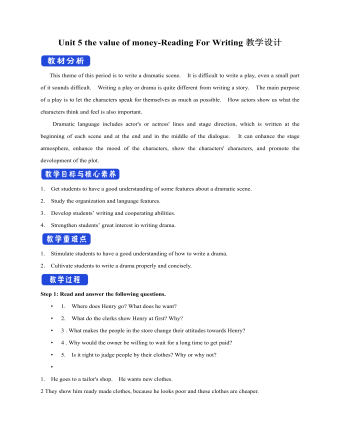
新人教版高中英语必修3Unit 5 the value of money-Reading For Writing教学设计一
【参考范文】Narrator:(Henry is smiling as he leaves the restaurant. As he is walking down the street, he sees a sign for a place that cuts hair. He decides to get it cut. )H=Henry;B=Barber;R=rude manH:Good afternoon, I'd like to get a cut, if I may. (The barber looks at Henry's hair and continues cutting another man's hair. )Er, I'd really like a haircut. As you can see it's much too long. B:(in a rude manner) Yes, I can see that. Indeed, I can. H:Fine, well I'll have a seat then. (He sits in one of the barber's chairs. The barber turns to look at Henry. )B:It's quite expensive here, you know!Are you sure you can afford it?H:Yes. I think so. (In comes the rude man. )R:Hey you there. I need a haircut quickly. Can you do me straightaway?B:All right, then, get in the chair and I'll see what I can do. R:Thank you. (sits down in one of the barber's chairs)H:Excuse me, but I was here first. Aren't you going to do my hair first?B:This man's in a hurry. H:Well so am I!I insist that you cut my hair first. B:OK, but I'll have to be quick. This gentleman is waiting. H:Thank you. (They both become quiet. After his hair is cut, the barber tells Henry how much he must pay. Henry shows the barber the bank note. )B:Why, Mr . . . (looks shocked)H:Adams. Henry Adams. I'm sorry, I don't have any change. R:You're that Mr Adams! Well,I'm glad I waited or I might never have known it was you. B:Why, Mr Adams, please don't worry!(wearing a big smile) Nothing to worry about!Nothing at all!Please come back any time, even if you only need too little hairs cut!It will be my honour to serve you!
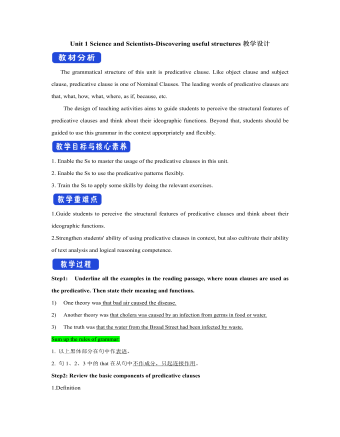
新人教版高中英语选修2Unit 1 Science and Scientists-Discovering useful structures教学设计
The grammatical structure of this unit is predicative clause. Like object clause and subject clause, predicative clause is one of Nominal Clauses. The leading words of predicative clauses are that, what, how, what, where, as if, because, etc.The design of teaching activities aims to guide students to perceive the structural features of predicative clauses and think about their ideographic functions. Beyond that, students should be guided to use this grammar in the context apporpriately and flexibly.1. Enable the Ss to master the usage of the predicative clauses in this unit.2. Enable the Ss to use the predicative patterns flexibly.3. Train the Ss to apply some skills by doing the relevant exercises.1.Guide students to perceive the structural features of predicative clauses and think about their ideographic functions.2.Strengthen students' ability of using predicative clauses in context, but also cultivate their ability of text analysis and logical reasoning competence.Step1: Underline all the examples in the reading passage, where noun clauses are used as the predicative. Then state their meaning and functions.1) One theory was that bad air caused the disease.2) Another theory was that cholera was caused by an infection from germs in food or water.3) The truth was that the water from the Broad Street had been infected by waste.Sum up the rules of grammar:1. 以上黑体部分在句中作表语。2. 句1、2、3中的that在从句中不作成分,只起连接作用。 Step2: Review the basic components of predicative clauses1.Definition
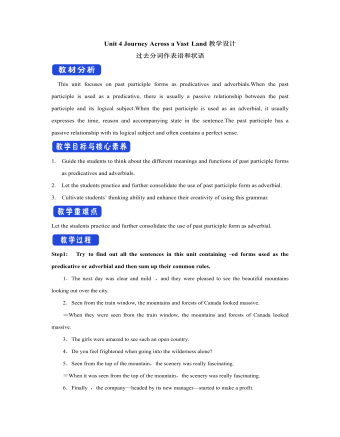
新人教版高中英语选修2Unit 4 Journey Across a Vast Land教学设计
当孩子们由父母陪同时,他们才被允许进入这个运动场。3.过去分词(短语)作状语时的几种特殊情况(1)过去分词(短语)在句中作时间、条件、原因、让步状语时,相当于对应的时间、条件、原因及让步状语从句。Seen from the top of the mountain (=When it is seen from the top of the mountain), the whole town looks more beautiful.从山顶上看,整个城市看起来更美了。Given ten more minutes (=If we are given ten more minutes), we will finish the work perfectly.如果多给十分钟,我们会完美地完成这项工作。Greatly touched by his words (=Because she was greatly touched by his words), she was full of tears.由于被他的话深深地感动,她满眼泪花。Warned of the storm (=Though they were warned of the storm), the farmers were still working on the farm.尽管被警告了风暴的到来,但农民们仍在农场干活。(2)过去分词(短语)在句中作伴随、方式等状语时,可改为句子的并列谓语或改为并列分句。The teacher came into the room, followed by two students (=and was followed by two students).后面跟着两个学生,老师走进了房间。He spent the whole afternoon, accompanied by his mom(=and was accompanied by his mom).他由母亲陪着度过了一整个下午。
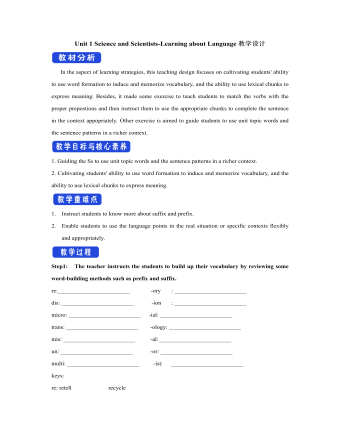
新人教版高中英语选修2Unit 1 Science and Scientists-Learning about Language教学设计
Step 7: complete the discourse according to the grammar rules.Cholera used to be one of the most 1.__________ (fear) diseases in the world. In the early 19th century, _2_________ an outbreak of cholera hit Europe, millions of people died. But neither its cause, 3__________ its cure was understood. A British doctor, John Snow, wanted to solve the problem and he knew that cholera would not be controlled _4_________ its cause was found. In general, there were two contradictory theories 5 __________ explained how cholera spread. The first suggested that bad air caused the disease. The second was that cholera was caused by an _6_________(infect) from germs in food or water. John Snow thought that the second theory was correct but he needed proof. So when another outbreak of cholera hit London in 1854, he began to investigate. Later, with all the evidence he _7_________ (gather), John Snow was able to announce that the pump water carried cholera germs. Therefore, he had the handle of the pump _8_________ (remove) so that it couldn't be used. Through his intervention,the disease was stopped in its tracks. What is more, John Snow found that some companies sold water from the River Thames that __9__________________ (pollute) by raw waste. The people who drank this water were much more likely _10_________ (get) cholera than those who drank pure or boiled water. Through John Snow's efforts, the _11_________ (threaten) of cholera around the world saw a substantial increase. Keys: 1.feared 2.when 3. nor 4.unless 5.that/which 6.infection 7.had gathered 8.removed 9.was polluted 10.to get 11. threat
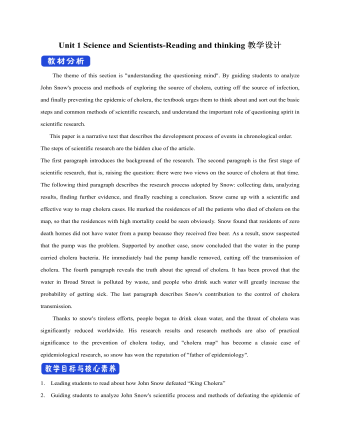
新人教版高中英语选修2Unit 1 Science and Scientists-Reading and thinking教学设计
Step 5: After learning the text, discuss with your peers about the following questions:1.John Snow believed Idea 2 was right. How did he finally prove it?2. Do you think John Snow would have solved this problem without the map?3. Cholera is a 19th century disease. What disease do you think is similar to cholera today?SARS and Covid-19 because they are both deadly and fatally infectious, have an unknown cause and need serious public health care to solve them urgently.keys:1. John Snow finally proved his idea because he found an outbreak that was clearly related to cholera, collected information and was able to tie cases outside the area to the polluted water.2. No. The map helped John Snow organize his ideas. He was able to identify those households that had had many deaths and check their water-drinking habits. He identified those houses that had had no deaths and surveyed their drinking habits. The evidence clearly pointed to the polluted water being the cause.3. SARS and Covid-19 because they are both deadly and fatally infectious, have an unknown cause and need serious public health care to solve them urgently.Step 6: Consolidate what you have learned by filling in the blanks:John Snow was a well-known _1___ in London in the _2__ century. He wanted to find the _3_____ of cholera in order to help people ___4_____ it. In 1854 when a cholera __5__ London, he began to gather information. He ___6__ on a map ___7___ all the dead people had lived and he found that many people who had ___8____ (drink) the dirty water from the __9____ died. So he decided that the polluted water ___10____ cholera. He suggested that the ___11__ of all water supplies should be _12______ and new methods of dealing with ____13___ water be found. Finally, “King Cholera” was __14_____.Keys: 1. doctor 2. 19th 3.cause 4.infected with 5.hit 6.marked 7.where 8.drunk 9.pump 10.carried 11.source 12.examined 13.polluted 14.defeatedHomework: Retell the text after class and preview its language points
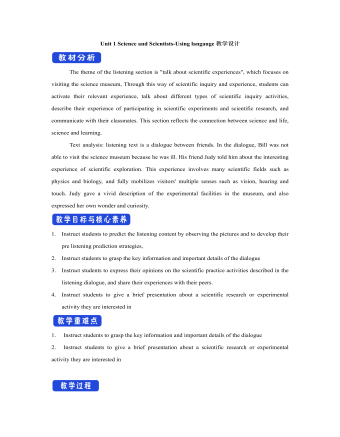
新人教版高中英语选修2Unit 1 Science and Scientists-Using langauge教学设计
This happens because the dish soap molecules have a strong negative charge, and the milk molecules have a strong positive charge. Like magnets, these molecules are attracted to each other, and so they appear to move around on the plate, taking the food coloring with them, making it look like the colors are quickly moving to escape from the soap.Listening text:? Judy: Oh, I'm so sorry that you were ill and couldn't come with us on our field trip. How are you feeling now? Better?? Bill: Much better, thanks. But how was it?? Judy: Wonderful! I especially liked an area of the museum called Light Games.it was really cool. They had a hall of mirrors where I could see myself reflected thousands of times!? Bill: A hall of mirrors can be a lot of fun. What else did they have?? Judy: Well, they had an experiment where we looked at a blue screen for a while, and then suddenly we could see tiny bright lights moving around on it. You'll never guess what those bright lights were!? Bill: Come on, tell me!? Judy: They were our own blood cells. For some reason, our eyes play tricks on us when we look at a blue screen, and we can see our own blood cells moving around like little lights! But there was another thing I liked better. I stood in front of a white light, and it cast different shadows of me in every color of the rainbow!? Bill: Oh, I wish I had been there. Tell me more!? Judy: Well, they had another area for sound. They had a giant piano keyboard that you could use your feet to play. But then, instead of playing the sounds of a piano, it played the voices of classical singers! Then they had a giant dish, and when you spoke into it, it reflected the sound back and made it louder. You could use it to speak in a whisper to someone 17 meters away.? Bill: It all sounds so cool. I wish I could have gone with you? Judy: I know, but we can go together this weekend. I'd love to go there again!? Bill: That sounds like a great idea!
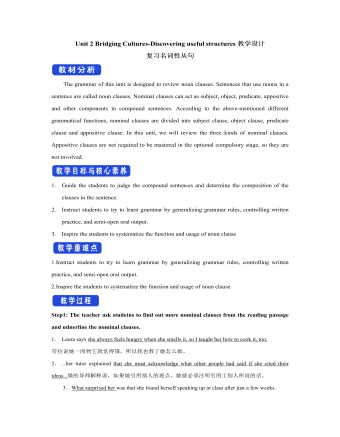
新人教版高中英语选修2Unit 2 Bridging Cultures-Discovering useful structures教学设计
The grammar of this unit is designed to review noun clauses. Sentences that use nouns in a sentence are called noun clauses. Nominal clauses can act as subject, object, predicate, appositive and other components in compound sentences. According to the above-mentioned different grammatical functions, nominal clauses are divided into subject clause, object clause, predicate clause and appositive clause. In this unit, we will review the three kinds of nominal clauses. Appositive clauses are not required to be mastered in the optional compulsory stage, so they are not involved.1. Guide the students to judge the compound sentences and determine the composition of the clauses in the sentence.2. Instruct students to try to learn grammar by generalizing grammar rules, controlling written practice, and semi-open oral output.3. Inspire the students to systematize the function and usage of noun clause1.Instruct students to try to learn grammar by generalizing grammar rules, controlling written practice, and semi-open oral output.2.Inspire the students to systematize the function and usage of noun clauseStep1: The teacher ask studetns to find out more nominal clauses from the reading passage and udnerline the nominal clauses.
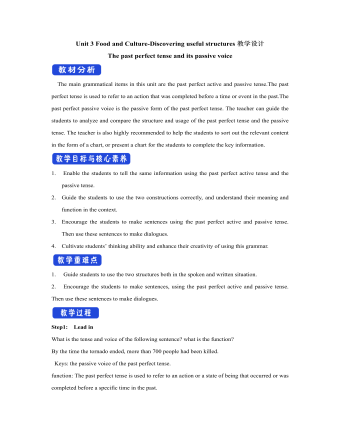
新人教版高中英语选修2Unit 3 Food and Culture-Discovering useful structures教学设计
The newspaper reported more than 100 people had been killed in the thunderstorm.报纸报道说有一百多人在暴风雨中丧生。(2)before、when、by the time、until、after、once等引导的时间状语从句的谓语是一般过去时,以及by、before后面接过去的时间时,主句动作发生在从句的动作或过去的时间之前且表示被动时,要用过去完成时的被动语态。By the time my brother was 10, he had been sent to Italy.我弟弟10岁前就已经被送到意大利了。Tons of rice had been produced by the end of last month. 到上月底已生产了好几吨大米。(3) It was the first/second/last ... time that ...句中that引导的定语从句中,主语与谓语构成被动关系时,要用过去完成时的被动语态。It was the first time that I had seen the night fact to face in one and a half years. 这是我一年半以来第一次亲眼目睹夜晚的景色。(4)在虚拟语气中,条件句表示与过去事实相反,且主语与谓语构成被动关系时,要用过去完成时的被动语态。If I had been instructed by him earlier, I would have finished the task.如果我早一点得到他的指示,我早就完成这项任务了。If I had hurried, I wouldn't have missed the train.如果我快点的话,我就不会误了火车。If you had been at the party, you would have met him. 如果你去了晚会,你就会见到他的。
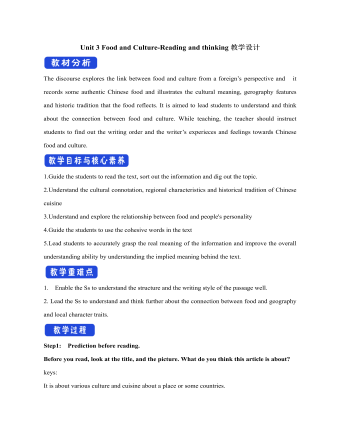
新人教版高中英语选修2Unit 3 Food and Culture-Reading and thinking教学设计
The discourse explores the link between food and culture from a foreign’s perspective and it records some authentic Chinese food and illustrates the cultural meaning, gerography features and historic tradition that the food reflects. It is aimed to lead students to understand and think about the connection between food and culture. While teaching, the teacher should instruct students to find out the writing order and the writer’s experieces and feelings towards Chinese food and culture.1.Guide the students to read the text, sort out the information and dig out the topic.2.Understand the cultural connotation, regional characteristics and historical tradition of Chinese cuisine3.Understand and explore the relationship between food and people's personality4.Guide the students to use the cohesive words in the text5.Lead students to accurately grasp the real meaning of the information and improve the overall understanding ability by understanding the implied meaning behind the text.1. Enable the Ss to understand the structure and the writing style of the passage well.2. Lead the Ss to understand and think further about the connection between food and geography and local character traits.Step1: Prediction before reading. Before you read, look at the title, and the picture. What do you think this article is about?keys:It is about various culture and cuisine about a place or some countries.
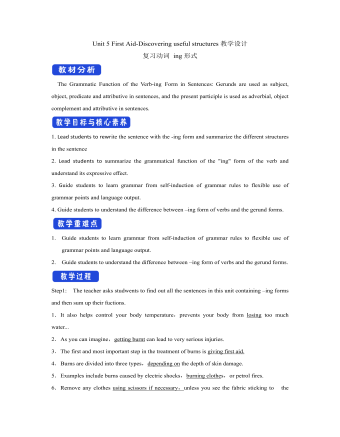
新人教版高中英语选修2Unit 5 First Aid-Discovering useful structures教学设计
You have no excuse for not going.你没有理由不去。He was punished for not having finished his homework.他因未完成作业而受到惩罚。2.动词ing形式复合结构由物主代词或人称代词宾格、名词所有格或普通格加动词ing,即“sb./sb.'s+doing”构成。动词ing形式的复合结构实际上是给动词ing形式加了一个逻辑主语。动词ing形式的复合结构有四种形式:①形容词性物主代词+动词ing②名词所有格+动词ing③代词宾格+动词ing④名词+动词ingHer coming to help encouraged all of us.她来帮忙鼓舞了我们所有人。The baby was made awake by the door suddenly shutting.这个婴儿被突然的关门声吵醒了。Can you imagine him/Jack cooking at home?你能想象他/杰克在家做饭的样子吗?无生命名词无论是作主语还是作宾语都不能用第②种形式。Tom's winning first prize last year impressed me a lot.汤姆去年得了一等奖使我印象深刻。Do you mind my/me/Jack's/Jack leaving now?你介意我/杰克现在离开吗?Excuse me for my not coming on time.很抱歉我没能按时来。His father's being ill made him worried.他父亲病了,他很担心。We are looking forward to the singer's/the singer to give us a concert.我们盼望着这位歌手来给我们举办一场演唱会。
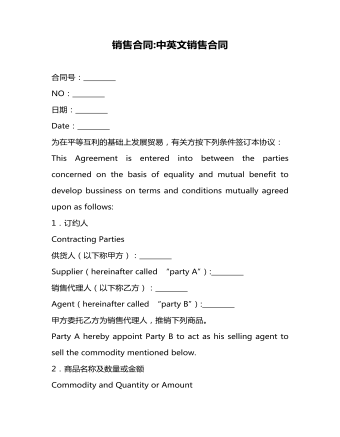
中英文销售合同
在本协议有效期内,乙方在上述经销地区所作广告宣传的一切费用,由乙方自理。乙方须事先向甲方提供宣传广告的图案及文字说明,由甲方审阅同意。
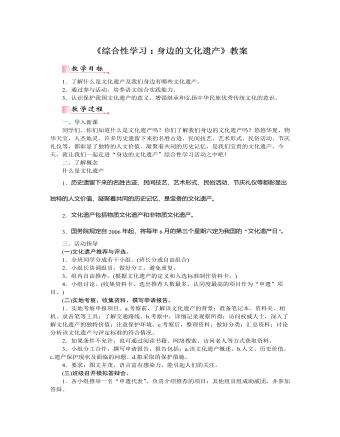
部编版语文八年级上册《综合性学习:身边的文化遗产》教案
当汽车行驶在乡间小道时,作家冯骥才再也没有了写作的冲动。往日白砖青瓦的农舍冒出了西洋式的尖顶和闪着异光的马赛克,炊烟袅袅,小桥流水成了埋藏在心底的梦。冯先生开始四处奔波,大声疾呼:救救我们的文化遗产!中国文化博大而宽广。她无处不在——融于书本,徜徉于江南小道,盘旋在峭壁飞檐……我们被这种浓厚的文化信息包围着,却道貌岸然地做着刽子手。忘记历史就是背叛。我们的文化遗产是历史的见证。秦始皇的兵马俑至今气宇轩昂地挺立着,隋朝大运河的波澜依旧拍打着千年的岸堤……孟江女的哭声凄婉悲恸,纤夫的号子似乎仍在耳边萦绕。沉淀了千年的沉浮、繁华、屈辱、悲愤,这些文化遗产烫帖了坎坷的心灵,将肃穆呈于世人。刀光剑影去了,长歌悲哭停止了,豪情厮杀消逝了……一切随着大江东去,只有千年松柏和着轻风耳语。
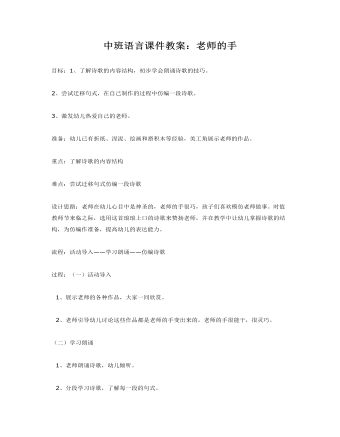
中班语言课件教案:老师的手
2、尝试迁移句式,在自己制作的过程中仿编一段诗歌。3、激发幼儿热爱自己的老师。准备:幼儿已有折纸、涅泥、绘画和搭积木等经验,美工角展示老师的作品。重点:了解诗歌的内容结构难点:尝试迁移句式仿编一段诗歌设计思路:老师在幼儿心目中是神圣的,老师的手很巧,孩子们喜欢模仿老师做事。时值教师节来临之际,选用这首琅琅上口的诗歌来赞扬老师,并在教学中让幼儿掌握诗歌的结构,为仿编作准备,提高幼儿的表达能力。流程:活动导入——学习朗诵——仿编诗歌过程:(一)活动导入 1、展示老师的各种作品,大家一同欣赏。 2、老师引导幼儿讨论这些作品都是老师的手变出来的,老师的手很能干,很灵巧。(
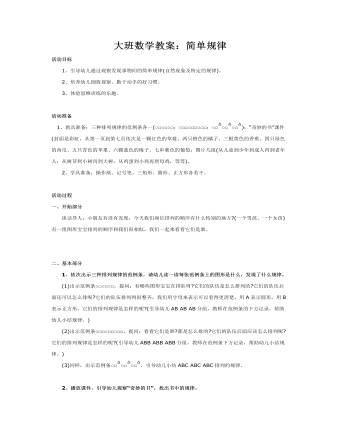
大班数学教案:简单规律
活动准备 1、教具准备:三种排列规律的范例条各一(○□○□○□;○□□○□□○□□;○□△○□△○□△);“奇妙的书”课件(封面是彩虹,从第一页到第七页依次是一颗红色的草莓、两只橙色的橘子、三根黄色的香蕉、四只绿色的西瓜、五只青色的苹果、六颗蓝色的梅子、七串紫色的葡萄:图片几组(从儿童到少年到成人再到老年人;从树芽到小树再到大树;从鸡蛋到小鸡再到母鸡,等等)。2、学具准备:操作纸、记号笔、三角形、圆形、正方形各若干。 活动过程一、开始部分 谈话导人:小朋友有没有发现,今天我们座位排列的顺序有什么特别的地方?(一个男孩、一个女孩)有一组图形宝宝排列的顺序和我们很相似,我们一起来看看它们是谁。
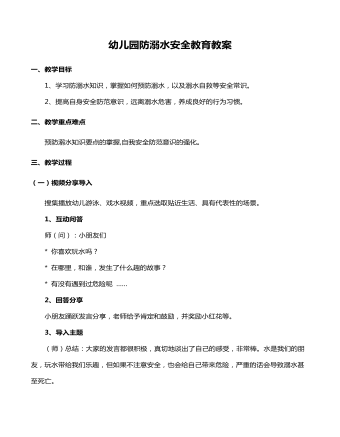
幼儿园防溺水安全教育教案
1、镇定第一。落水后应保持镇定,胡乱举手或挣扎反会使身体下沉、呛水而淹溺。2、仰泳露鼻。可采取头向后仰、面部向上的仰泳法,使口鼻露出水面进行呼吸。3、深吸浅呼。吸气要深,呼气要浅。4、减轻自重。及时甩掉鞋子和口袋里的重物,但不要脱掉衣服,因为它会产生一定的浮力,对你有很大帮助。5、观察周围。假如周围有木板,应抓住,借用木板的浮力使自己的身体尽量往上浮。6、缓解“抽筋”。若肌肉痉挛(“抽筋”),用手握住痉挛肢体的远端,做反复屈伸运动。7、保存体力。会游泳者在落水自救的过程中,应注意防止“抽筋”,并保存体力。8、配合施救。如果有人跳水相救,千万不可死死抱住救助者不放,而应尽量放松,配合救助者把你带到岸边。
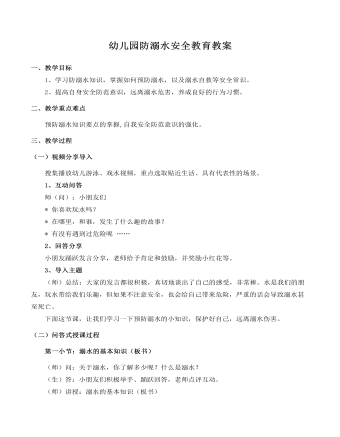
幼儿园防溺水安全教育教案
(一)视频分享导入搜集播放幼儿游泳、戏水视频,重点选取贴近生活、具有代表性的场景。1、互动问答师(问):小朋友们* 你喜欢玩水吗?* 在哪里,和谁,发生了什么趣的故事?* 有没有遇到过危险呢 ……2、回答分享小朋友踊跃发言分享,老师给予肯定和鼓励,并奖励小红花等
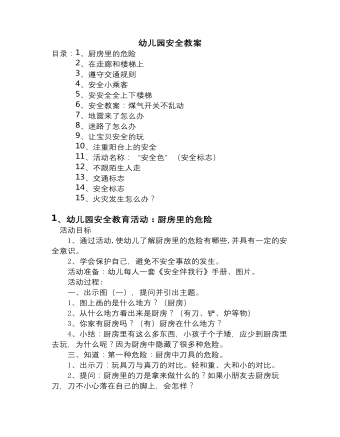
幼儿园安全教育活动教案15篇
1、幼儿园安全教育活动:厨房里的危险 活动目标1、通过活动,使幼儿了解厨房里的危险有哪些,并具有一定的安全意识。2、学会保护自己,避免不安全事故的发生。 活动准备:幼儿每人一套《安全伴我行》手册、图片。 活动过程: 一、出示图(一),提问并引出主题。1、图上画的是什么地方?(厨房)2、从什么地方看出来是厨房?(有刀、铲、炉等物)3、你家有厨房吗?(有)厨房在什么地方?4、小结:厨房里有这么多东西,小孩子个子矮,应少到厨房里去玩,为什么呢?因为厨房中隐藏了很多种危险。 三、知道:第一种危险:厨房中刀具的危险。1、出示刀:玩具刀与真刀的对比。轻和重、大和小的对比。2、提问:厨房里的刀是拿来做什么的?如果小朋友去厨房玩刀,刀不小心落在自己的脚上,会怎样?3、出示图(二):一个小孩玩厨房里的刀,刀落地,差点落在幼儿脚上,真危险。让幼儿看图和感知一下真刀,让其明白:厨房里的真刀不能玩,如果不小心落在地上,脚上都会受伤,还会砸着脚趾,很危险! 四、第二种危险:厨房燃气炉的危险1、让个别幼儿找出燃气炉玩具,让小朋友想想厨房中燃气炉有危险吗?有哪些危险?2、出示图(三):一个小孩在厨房里自己去开燃气炉,爆出了火光,射在小孩脸上。3、师:小朋友自己不能开燃气炉,因年龄小,掌握不好开关,燃气泄漏会中毒,还会引发燃气爆炸的。 五、第三种危险:炒菜时油爆在脸上,眼睛里的危险。1、出示图(四),让幼儿观察后讲出:妈妈在炒菜,个子矮、年龄小的孩子不能靠近锅边,油爆在脸上、眼睛里,小朋友哭了。2、知炒菜的油爆在脸、眼上,会烧伤、会瞎眼等。 六、第四种危险:用热水瓶自己倒水,从炉子上取放的危险。1、出地图(五):一小女孩手抱开水瓶自己去厨房倒炉子上的开水。2、让小朋友说出图中的危险。3、师:烧开的水或刚做好的饭菜温度高,不小心碰倒了会被烫伤的。 七、要避免这些危险,有什么办法?(远离厨房,不一个人在厨房里玩……) 八、看《安全伴我行》手册,让小朋友一边看一边讲出厨房中有哪些危险,并把看到的故
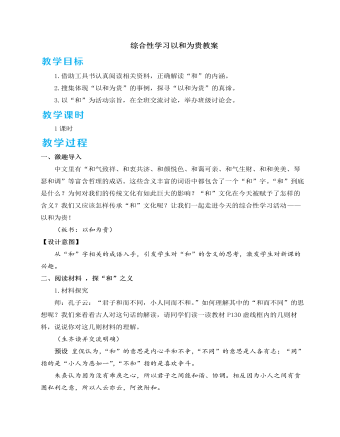
人教部编版语文八年级下册综合性学习以和为贵教案
请同学们阅读教材P133虚线框内的内容,根据要求选择某一新闻事件,开展时事讨论,积极发表看法。提示:学生围绕事件展开讨论,积极发言,认真听取同学的意见,讨论时注意遵守之前制定的“班级议事规则”。(全班讨论,师总结)【设计意图】此环节通过开展班级讨论活动,制定贴近学生生活的“班级议事规则”,将学习的与“和”相关的知识引入实践生活,培养学生运用知识指导生活实践的综合能力。五、以“和”为文,总结收获师:同学们,通过本次综合性学习活动,我们知道了“以和为贵”不仅是为人处世的准绳,也是从政治国的法宝,是处理国际关系的原则,是创建和谐社会的前提条件。通过这次活动,你对中国文化中的“和”一定也有了许多的认识和理解吧!任选一个角度,写一篇不少于600字的作文,谈谈你的收获。
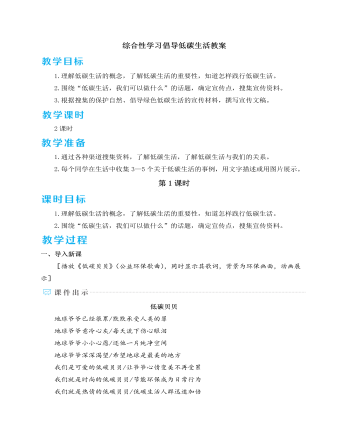
人教部编版语文八年级下册综合性学习倡导低碳生活教案
一是缩小页边距和行间距,缩小字号。正式文件一般对字号、间距有严格的要求,但是在非正式文件里,可适当缩小页边距和行间距,缩小字号。可“上顶天,下连地,两边够齐”,对于字号,以看清为宜。二是纸张双面打印、复印。纸张双面打印、复印既可以减少费用,又可以节能减排。如果全国10%的打印、复印做到这一点,那么每年可减少耗纸约5.1万吨,节能6.4万吨标准煤,相应减排二氧化碳16.4万吨。三是打印时能不加粗、不用黑体的就尽量不用,能节省墨粉或铅粉。此外,能够用电脑网络传递的文件就尽量在网络上传递,比如电子邮件、单位内部网络等,这样下来也可以节约不少纸张。(选自《低碳校园——让我们的学校更美好》,天津人民出版社2013年版)(学生围绕各自任务,课外搜集制作宣传材料,时间为一周。)【设计意图】本环节先从探讨自身在低碳生活中力所能及的事情,让学生切实认识到低碳生活就在日常的一举一动中。然后围绕主题分组,并保证足够的时间,让学生去收集整理资料,落实任务,使学生能真正成为低碳的倡导者和践行者。
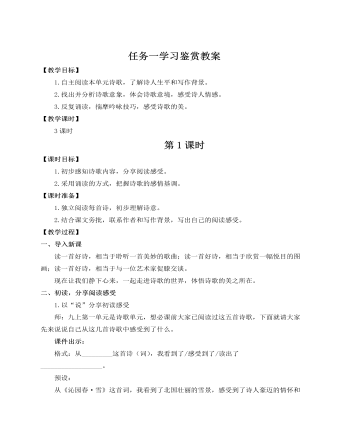
人教部编版语文九年级上册任务一学习鉴赏教案
审美鉴赏与创造——诗歌意象“诗是无声画”,诗要用形象说话。一般说来,诗歌写作是由“灵感—寻象—寻言”这三个阶段构成的。获得灵感,就是获得一种诗美体验;获得诗美体验之后,就要将诗美体验转化为诗歌意象。诗歌意象创作要注意以下几个方面:1.象征手法的运用。象征多用具体生动的形象来暗示某种生活、情绪和哲理,可以将抽象的事物变得具体可感。2.要善于将抽象的感情形象化。诗歌创作中,或是即事抒情,或是融情于景,或是托物言志,要尽力将情感形象化,避免单纯地抒情。3.意象的组合。意象组合是用一个接一个的意象,按照一定的美学原则把它组合起来,形成一幅幅跳跃的画面,使它们产生对比、衬托、联想、暗示等作用,让读者通过一系列的意象组合去揣摩和领悟作者的意图。





















